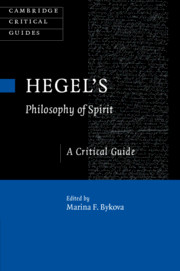Book contents
- Hegel’s Philosophy of Spirit
- Cambridge Critical Guides
- Hegel’s Philosophy of Spirit
- Copyright page
- Contents
- Contributors
- Acknowledgments
- Abbreviations
- Introduction
- Part I Philosophy of Spirit and Hegel’s Philosophical System
- Part II Philosophy of Subjective Spirit
- Part III Philosophy of Objective Spirit
- Chapter 6 The Idea of a Speculative Philosophy of Objective Spirit
- Chapter 7 Objective Spirit
- Chapter 8 On Hegel’s Account of Selfhood and Human Sociality
- Chapter 9 Hegel’s Idea of the State
- Part IV Philosophy of Absolute Spirit
- Bibliography
- Index
- Cambridge Critical Guides
Chapter 8 - On Hegel’s Account of Selfhood and Human Sociality
from Part III - Philosophy of Objective Spirit
Published online by Cambridge University Press: 24 June 2019
- Hegel’s Philosophy of Spirit
- Cambridge Critical Guides
- Hegel’s Philosophy of Spirit
- Copyright page
- Contents
- Contributors
- Acknowledgments
- Abbreviations
- Introduction
- Part I Philosophy of Spirit and Hegel’s Philosophical System
- Part II Philosophy of Subjective Spirit
- Part III Philosophy of Objective Spirit
- Chapter 6 The Idea of a Speculative Philosophy of Objective Spirit
- Chapter 7 Objective Spirit
- Chapter 8 On Hegel’s Account of Selfhood and Human Sociality
- Chapter 9 Hegel’s Idea of the State
- Part IV Philosophy of Absolute Spirit
- Bibliography
- Index
- Cambridge Critical Guides
Summary
Hegel’s account of the self, sketched in his Phenomenology of Spirit and systematically elaborated in the Encyclopaedia Philosophy of Spirit, is one of the most influential and insightful examinations of the concept in the history of modern philosophy. However, it seems to point in too many directions to allow consensus about its meaning. Much of what Hegel says about the self appears to conflict with many central assumptions of the mainstream interpretation that Hegel is a metaphysician who places the concept of “cosmic” spirit in the center of his system. This “cosmic” spirit is construed as some transcendent, supra-human entity or some kind of presence within the world of the absolute substance which submerges individual consciousness (Theunissen 1970, 59–62; Löwith 1991). Even those who insist on a non-metaphysical reading of Hegel, and who seek to appropriate his philosophy without exaggerating the universal dimensions of spirit, have trouble providing a satisfactory explanation of Hegel’s account of the self in all its complexity (Pippin 1989; Taylor 2000; Holgate 2005). Their interpretations attempt to accommodate Hegel’s narrative about the development of individual consciousness (Pippin 2011), and they usually discuss this development in purely epistemological terms (merely as a cognitive enterprise), without emphasizing social, historical, and cultural aspects of this process. What often escapes commentators’ attention is that the sociality of a human being bears much weight in Hegel’s discussion of the self, or the I, as Hegel prefers to call it. To be sure, some commentaries seek to highlight the social dimension of Hegel’s account of the individual subject, yet most of these attempts discuss the topic almost exclusively in terms of the principle of recognition, and most notably, in terms of the concept of mutual recognition that Hegel establishes in his Phenomenology (Williams 1997; Cobben 2009; Redding 2009; Kok 2013; Testa and Ruggiu 2016).1 These discussions rightly emphasize the distinctive feature of Hegel’s account of the self: that any individual self is a mutual, social, collective project, who arises only through interactions with other such individuals. Such social interactions are crucial not only because the encounter with another self-consciousness is a necessary condition of self-consciousness. As self-conscious beings, we advance claims about putatively objective states of affairs, and one’s authority to advance objective claims needs to be acknowledged (recognized) by another self-conscious being.
- Type
- Chapter
- Information
- Hegel's Philosophy of SpiritA Critical Guide, pp. 164 - 185Publisher: Cambridge University PressPrint publication year: 2019
- 1
- Cited by

